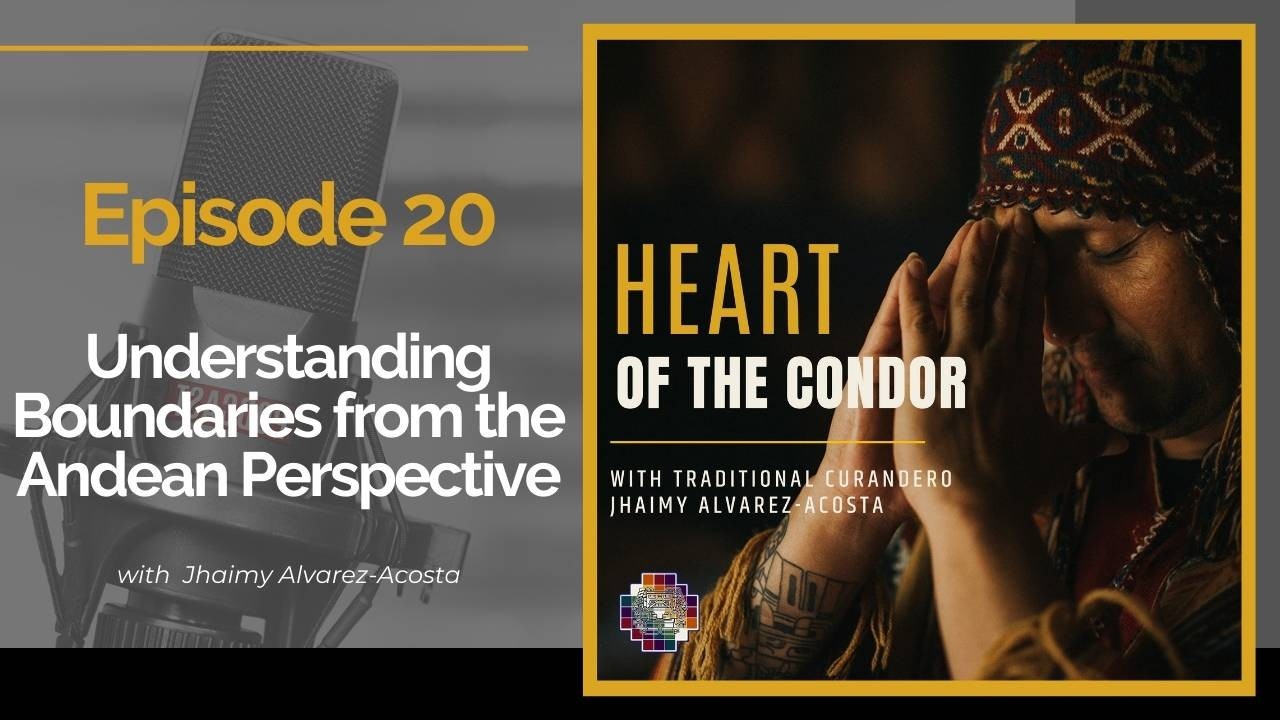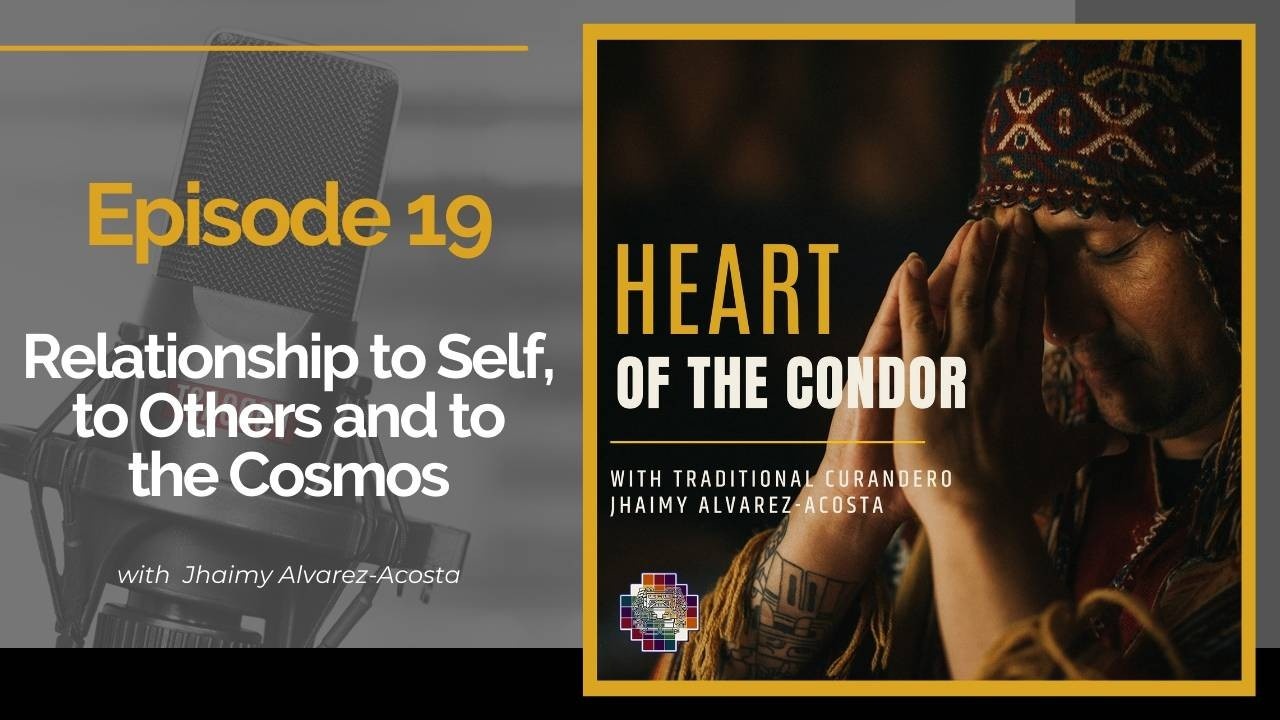Episode 20: Understanding Boundaries from the Andean Perspective

In this episode Jhaimy reflects on a question that he often gets asked during his personal sessions...how to set up personal boundaries? He shares his perspective and the teachings of his Elders about this concept and how to implement 3 specific steps to create boundaries. He also describes a powerful mantra that can be used when you find yourself in difficult situations. A key teaching from this episode is the importance of finding balance in your life and that this is perhaps the most important medicine when creating boundaries.
Quotes:
"To bring medicine into all of your relations and principally to your relationship with you which is the most important one."
"Your balance is the most important thing in your life."
"Creating boundaries in life means being in balance with yourself."
"If you digest this process in harmony, you will bring this harmony to the situation and to the people that you love.”
Episode 19 - Relationship to Self, to Others and to the Cosmos

In this episode Jhaimy reflects on the times that we are living in and how his Elders share that one of the biggest challenges right now for humanity is how to be in relationship with ourselves and with others. This translates into how we are then with our relationship to the Cosmos and to Mother Earth.
He shares how the two Andean principles of Munay (Sweetness, Beauty, Love and Magic) and Ayni (relationship) can support the cultivation of healthy relationships with self and with others and the importance of "how you feel" more than "how you think" as being medicine.
He also shares teachings connected to the difference between rights and responsibilities as well as why he believes in the importance of respect more than tolerance.
Quotes:
“It is not the words that you say but the way that you feel in the moment that you say something, there is the medicine, there is where we need to give our attention.”
"We are really busy as humanity looking at all of the big things, i...
Episode 18 - Plant Master Medicine Part 2 – Honouring Intentions and Traditions

In this episode, Jhaimy goes deeper into our unique relationships with Master Plants and how our intentions can impact our experiences. When connecting with Master Plants, we must honour and learn from the Indigenous people who know these plants and respect the traditions that have been formed over thousands of years. By acknowledging our responsibilities and opening our hearts to greet these Masters with reverence, they are then more able to open their world to receive us.
Quotes:
“My motivation is to try to be free of my own fears.”
Be responsible. Remember that exists one society that worked thousands of thousands of years to protect - to be the warriors - of this tradition. And if you want to learn, first, be a good helper. Not just for a month. Not just for one ceremony. Be a good helper for life. Because this is what’s going to help you to receive the blessings that exists in the medicine journey.”
“To interpret the experience, you need to learn the language of the me...
Episode 17 - Introducing the Andean Principle of Illawy – The Power of Parity

In this episode, Jhaimy introduces the Andean principle of Illawy. While this principle is perhaps most simply described as parity or partnership, Jhaimy shows us how Illawy helps to shape our reality. Illawy helps us to remember “the origins of everything” and can support our understanding of how our intentions and feelings give rise to our experiences. Integrating this principle helps us to transform and transmute any intentions that may not be in harmony with what we want to receive in life.
Quotes:
“The Ancestors always say, “Be a little more aware of what motivates you to create things in your life.”
“My master says one day to me, “Who you are to judge yourself? And who you are to judge others? You do the things that you need to do because it's already things that you need to learn. So don't be so hard with you because whatever you do in life is what you need to learn. And this is the Illawy. This is what this medicine brings to us and this principle teaches.”
Episode 16 - Journey to Peru – A Pilgrimage for Your Soul

In this episode, Jhaimy talks about the sacred journeys that he leads in Peru and explains why he calls them a “pilgrimage”. In older times, such trips to these temples and Andean sites would have been much more difficult to make than today, and so Jhaimy helps us to understand the sacrality and symbology in these places, while also guiding us to walk with deep reverence on these paths to honour both the Ancestors and ourselves. As a Traditional Curandero, he guides these journeys to not only share his wisdom about these sacred spaces, but to help people to transform and transmute their perceptions, ideas, and feelings along the way; to see their current lives with new eyes. When we travel in a sacred way to these sites and temples, we transform and transmute ourselves, and we are more open to recognizing our day-to day lives as an ongoing sacred journey – a pilgrimage for our soul.
Quotes:
“We do this journey in a sacred way, and we live in a sacred way.”
Episode 15 - Walking the Path of Living in a Good Way (Allin Kausay)

In this episode, Jhaimy describes the Andean vibration of the Allin Kausay (living in a good way), and how it compares to typical human patterns which may be more commonly associated with a difficult way of living. He offers guidance for healing our hearts, and our world, through awareness and appreciation of the gifts that Mother Earth and the Cosmos provide us with every day. We are reminded to walk on our paths gently, humbly, and with compassion for others along the way, and when in doubt – pray, sing, and connect with the roots of life. LISTEN NOW
Quotes:
“Maybe you don’t need to know. Maybe just trust. Have faith in the eyes of your feet. Let your feet guide you, on your path back home.”
“Be humble. Remember that sometimes you made the same mistakes.”
Episode 14 - Andean Dream Wisdom & Symbology

In this episode, Jhaimy shares the Andean perspective on how we can use our own personal symbology to assist in our experiences of Dreamtime. Whether it’s using the 4 elements or allowing an animal totem to “eat you”, he encourages us to remember the power that we have to create within our dreams and the importance of the correct interpretation to guide us deeper on our dreaming journeys.
Quotes: :
“Because it's your world, because it's your reality, you have the power. Maybe one of the most fantastic and beautiful powers that exists - you are free to create whatever you like.”
“Every single dream has something to teach, so learn. But also remember; it’s your world, it’s your reality, it’s your own space.”
Episode 13 - The Ayllu: Spiritual Family and Sacred Community

In this episode, Jhaimy describes the Andean social structure known as the Ayllu. The Ayllu is both a chosen spiritual family and a community of shared practice. People come together to support each other through day-to-day life and the processes of Yachay (Sacred Learning) and Llanquay (Sacred Work). Within this community, all experiences are shared energetically and held sacred.
Quotes:
“When somebody is sick, all of the community is sick, but when somebody arrives to another point of view, another reality, or learns something amazing, the community also energetically arrives to this space more quickly.”
“In the Andean tradition, when you live in a community, you need to be responsible and be more impeccable with your ideas, with your feelings, because this is going to help you and everyone – all of your Ayllu, all your spiritual family.”
Episode 12 - Cultivating Personal Peace Through the Understanding of Pacha - Time & Space

In this episode, Jhaimy shares the Andean wisdom of Pacha – time and space; “…two beautiful vibrations that move together”, with a focus on how we experience time. Today, we commonly view the past as behind us, and the future as being ahead of us. However, in Andean traditions, the future lives behind us, unseen and unknown. The past, on the other hand, is seen as in front of us; it is what we must face, learn from, and walk through each day. When we see our past in front of us and learn to witness, embrace, and learn from our patterns, then we will have the insight to make better choices and create a more peaceful, harmonious life.
Quotes: :
““One of my elders said something beautiful. ‘Study your past, and in this way, you’re going to live a better present and call a better future’. And maybe this is a big medicine.”
“When you are in peace with you, everything is fantastic. Everything’s going to be OK, because you’re already finding the medicine that your heart needs to naviga...
Episode 11 - Ñyo Kan Kani: Building a Sacred Relationship with the Self

In this episode, Jhaimy introduces the Andean concept of Ñyo Kan Kani (I Am Me). He shares that one of the main sicknesses for humanity today is the need for “understanding”. Ñyo Kan Kani is not simply understanding yourself, but it is an action; a relationship that goes beyond knowing yourself and looks deeper at how you act in relationship with yourself, and how you hold yourself in this relationship. While we may not have the capacity to understand ourselves, or our full reality, we can accept that we exist and respect who we are – I Am Me. This relationship with ourselves, between I and Me, then leads us to a greater ability to live in harmony with the “we”.
Quotes:
“Who are we to understand everything? Accept - And when you accept that you exist, when you accept your Ñyo Kan Kani – or that I am me - you are beginning to create a relationship between me and I.”
“When you live in a beautiful relationship with you, you have the way to create beautiful relationships with the ot...





